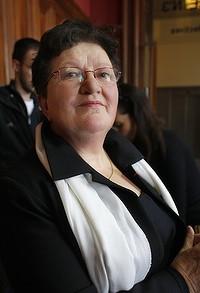
Carmen Colle does not look like a woman threatening to bring down the whole house of French fashion.
Standing in her deserted factory in the east of the country surrounded by knitting machines covered in dust cloths, this diminutive grandmother seemed almost embarrassed by her portrayal as a revolutionary and iconoclast.
"This is not about me, it's about honour and justice and noblesse," she said quietly.
Mrs Colle once produced stunning sequinned tops for Yves Saint Laurent, $5500 Christian Lacroix cardigans and knitted wedding dresses sent down the catwalk by Jean Paul Gaultier.
But she says she has landed no orders from the great and good of French haute couture since suing Chanel for allegedly copying one of her handmade knitting patterns.
Mrs Colle says Chanel took a -sample of a newly designed crochet material from her company, World Tricot, set up to employ jobless immigrant women, and used it as the basis for a jacket, which Chanel ordered not from her firm but from another supplier in Italy.
She is claiming euros 2.5million in damages for alleged counterfeiting and breach of contract.
Chanel vigorously denies the accusations and is counter-suing World Tricot for tarnishing its name. It insists the "creator" of the jacket is its chief designer, Karl Lagerfeld.
After four years of legal wrangling that has taken 61 year-old Mrs Colle's company to the brink of ruin, judges are deliberating on the case, seen as pitting fashion's Davids - the anonymous artisans known as "petites mains" (small hands) who toil in workshops all over France - against the Goliaths, like Chanel, who rely on their skills.
"I am not doing this for me or my company, I'm doing this for the women who worked here and created the designs, the small people who are forgotten, who don't exist," said Mrs Colle.
Lure, a town of 9,000 in Franche-Comte, at the crossroads of France, Germany and Switzerland, has higher than average unemployment. In 2000 Mrs Colle's factory was a hive of activity for 90 employees with a turnover approaching two million euros . Now it has just 12 staff.
From shelves packed with boxes of knitting and crochet samples, she produced magazine clippings showing catwalk models - including Naomi Campbell - wearing clothes made out of her designs.
Like Coco Chanel, Carmen Colle started with almost nothing. She left school at 14, then married and had a family before becoming involved in helping refugees.
In 1990, to create proper jobs for them, she took a loan and set up World Tricot. By 2004 Chanel was her biggest customer and she was having to turn down other work.
The following year, visiting Tokyo, she was shocked to see a jacket in the Chanel shop whose pattern seemed identical to a sample her firm had submitted.
"I thought Chanel wouldn't do that; to me Chanel was the image of loyalty and noblesse," she said.
She claimed she tried to talk to the fashion house but nobody would take her calls - and said she had since been unable to win orders elsewhere.
"From one day to the next we lost all our business," she said. "I would knock on doors and nobody wanted to see me."
A spokesman for Chanel said the company "firmly rejected" all World Tricot's accusations.
"Chanel claims the creation belongs to it and that making a crochet sample based on precise instructions given by Chanel does not mean someone else can claim to have created it," she said.
"We also contest the accusation that we breached any contract. Between April 2005 and March 2006 Chanel gave World Tricot orders for an amount comparable to that paid annually to World Tricot since we started working with them in 1999."
Mrs Colle's lawyer Pascal Crehange argued during the trial that at the very least the Chanel jacket was the product of collaboration between the supplier and the fashion house, and Chanel should have asked for permission to use the crochet sample.
A verdict is expected on December 11.
France's fashion giants fear a decision against Chanel would spark an industry-wide revolution.





